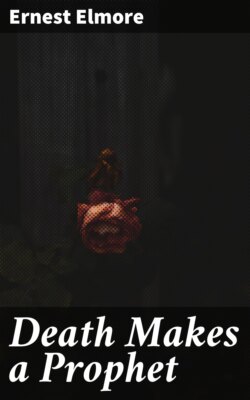Читать книгу Death Makes a Prophet - Ernest Elmore - Страница 7
На сайте Литреса книга снята с продажи.
III
ОглавлениеTable of Contents
From its inauguration Cooism had attracted a very distinct type of initiate. It was a cult for the few rather than the many; and the few for the most part were well able to afford the exclusive entrance fee that was deliberately imposed by Mrs. Hagge-Smith in order to sort the sheep from the goats. Alicia, when backing her enthusiasms, preferred quality rather than quantity. She liked her religion to have a certain ton, a certain je ne sais quoi of good-breeding about it. She often felt that Eustace, as High Prophet, was a trifle too democratic in outlook. To him all converts were grist to the mills of his particular creed, irrespective of their accents and incomes. Even as High Prophet, Eustace himself was not quite...and here Mrs. Hagge-Smith would twiddle her fingers and shake her grey locks.
Then, enhaloed in mystery, there had arrived in Welworth Garden City a man after Alicia’s own heart. A man with poise and personality; a man with a black beard and dark, hypnotic eyes; a man with an exotic accent and the manners of a French count.
“Penpeti,” declared Mrs. Hagge-Smith, “is not only a man—he’s an experience!”
Be that as it may, Peta Penpeti soon rose in the ranks of the order. He brought a new and exciting mysticism into the meetings, an oriental spice that had previously been missing from the hot-pot. His name alone stirred the imagination, for wasn’t Penpeti a genuine ancient Egyptian surname? It meant “divine father”, and that, in fact, is what Penpeti soon became to many of the more impressionable and younger daughters of Cooism. Although there was nothing divine in his appearance, his attitude to these young ladies, however, was strictly paternal and his devotion to the Movement seemed irreproachable. He claimed to be a reincarnation of a certain Pen Penpeti, a priest in the temple of Amen-Ra at Thebes, but his more immediate origins remained shrouded in mystery. It was rumoured that he had actually been born within sight of the Nile, that he had later led a life of dissipation in Cairo, run through a considerable fortune, repented of his ways and arrived in England in search of salvation. He had been tutored, so it was said, by a Scotch dominie, which doubtless accounted for his faultless use of the English language.
Mrs. Hagge-Smith found him delightful. His polish and urbanity were refreshing after Eustace’s rather dreary humility. She liked the jaunty angle at which he wore his fez and the long black caftan he wore beneath his black cloak. She liked his oriental exaggerations, his long, mystical silences, his air of culture and assurance.
In Welworth, Penpeti was probably the finest single advertisement that the Children of Osiris had ever received. Comment on him invariably led to some mention of Cooism, and Cooism to some mention of Eustace Mildmann. So, in a way, Eustace was bathed in reflected glory. After the advent of Penpeti, Mrs. Hagge-Smith was able to double the annual subscription and, out of the resultant profits, Penpeti was voted a salary of five hundred a year. He seemed to have no money of his own, which was not surprising since he was supposed to have squandered a fortune. He lived modestly in a Garden City Council House in Wistaria Road—that is to say, an ordinary Council House with blue-painted frames and doors, two bay-trees in scarlet tubs and a flagstone path. He took most of his meals at the Rational Feeding Restaurant, a vegetarian dive on Broadway, Welworth’s main thoroughfare. A daily woman came in and “did” for him. Penpeti, in short, for all his extravagant appearance, lived in an atmosphere of monastic isolation. But whether by choice or necessity nobody was prepared to say.
But there they were, this exclusive, intelligent coterie of seekers-after-truth—eccentric, temperamental, “different”, perhaps, but at bed-rock moved by those passions, great and small, which are the arbiters of human action. On the surface the Children of Osiris seemed to reflect indeed all the uncomplicated and lovable traits of the very young. They seemed to be banded together by their common faith, imbued with an almost excessive consideration for each other’s feelings. But appearances, even in a Garden City, are deceptive. Beneath this concealing crust of Cooism a ferment was at work; small hostilities were growing; vague jealousies were gaining strength; little intrigues swelling into obsessions. And far off, no more than a dark speck beyond a distant horizon, wasn’t there a nebulous hint of approaching tragedy in the air? Big oaks from little acorns grow, and viewing events in retrospect there seems little doubt that the jumping-off point of this tragedy was Alicia Hagge-Smith’s “vision”. Without her “vision” circumstances favourable to a murder would never have materialised. And without a murder, Inspector Meredith would never have heard of the Children of Osiris. As it was, he always considered it to be one of the most interesting, bizarre, and exacting of all his cases.
